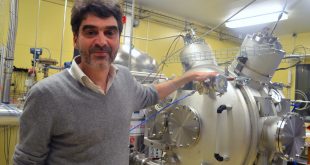A team of researchers at IMT Atlantique is developing a new type of medical scanner called XEMIS. To create the device, the team drew on their previous research in fundamental physics and the detection of dark matter, using liquid xenon technology. The first time the device was tested was using small animals. It allowed the scientists to significantly lower the …
Read More »Search Results for: dark matter
Even without dark matter Xenon1T is a success
Xenon1T is the largest detector of dark matter in the world. Unveiled in 2015, it searches for this invisible material — which is five times more abundant in the universe than ordinary matter — from the Gran Sasso laboratory in Italy, buried under a mountain. In May 2017, an international collaboration of 130 scientists published the first observations made by …
Read More »XENON1T: a giant dark matter hunter
Dark matter, five to six times more abundant than ordinary matter, remains one of our universe’s greatest enigmas. Invisible and unobservable, it continues to challenge physicists around the world. With the aim of detecting and studying it, Dominique Thers and his team from Subatech joined the XENON project in 2009. On November 11, 2015, in the heart of the Gran …
Read More »When engineering helps improve healthcare
Editorial. Tomorrow’s medicine will be at least 4P: personalized, preventive, predictive, participative. ‘At least,’ because some would readily add “precise,” “proof” (evidence-based), “pathway-based” etc. Beyond naming this type of medicine and determining the correct number of Ps, medicine is clearly undergoing a profound change. A transformation supported in part by engineering, which is bringing major innovations to the healthcare …
Read More »XENON1T observes one of the rarest events in the universe
The researchers working on the XENON1T project observed a strange phenomenon: the simultaneous capture of two electrons by the atomic nucleus of xenon. A phenomenon so rare that it earned the scientific collaboration, which includes the Subatech[1] laboratory, a spot on the cover of the prestigious journal Nature on 25 April 2019. It was both the longest and rarest phenomenon …
Read More »Xenon instruments for long-term experiments
From the ancient gnomon that measured the sun’s height, to the Compton gamma ray observatory, the microscope, and large-scale accelerators, scientific instruments are researchers’ allies, enabling them to make observations at the smallest and largest scales. Used for both basic and applied research, they help test hypotheses and push back the boundaries of human knowledge. At IMT Atlantique, researcher Dominique …
Read More »When Science Fiction Helps Popularize Science – An Interview with Roland Lehoucq
What is energy? What is power? Roland Lehoucq, an astrophysicist at CEA and professor at École Polytechnique and Sciences Po, uses Science Fiction to help explain scientific principles to the general public. Star Wars, Interstellar, The Martian… These well-known, popular movies can become springboards for making science accessible to everyone. During his conference on “Energy, Science and Fiction” on December …
Read More »Dominique Thers
IMT Atlantique | #DarkMatter #WIMP #Subatech
Read More »KM3NeT: Searching the Depths of the Sea for Elusive Neutrinos
The sun alone produces more than 64 billion neutrinos per second and per cm2 that pass right through the Earth. These elementary particles of matter are everywhere, yet they remain almost entirely elusive. The key word is almost… The European infrastructure KM3NeT, currently being installed in the depths of the Mediterranean Sea, has been designed to detect the extremely faint …
Read More »Intelligence incarnated, a bio-inspired approach in the field of robotics
Using nature as inspiration is certainly the oldest scientific approach and one that still has much to reveal. Bio-inspired robotics is a research topic at Mines Nantes that uses this process. It does not aim to simply mimic, but actually to understand the tricks nature has found to solve problems. Researcher Frédéric Boyer’s work is driven by such meticulous observation. …
Read More » I'MTech L'actualité scientifique et technologique de l'IMT
I'MTech L'actualité scientifique et technologique de l'IMT









